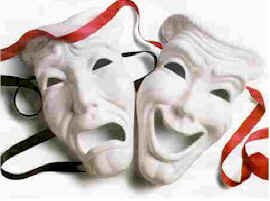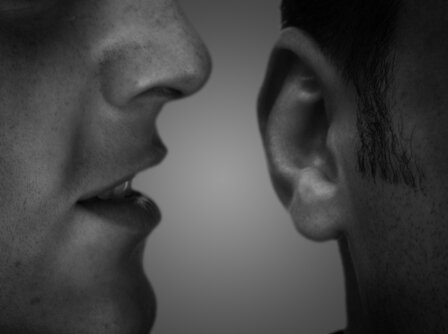Top 10 Bizarre and Least Understood Mental Illnesses
Suggested by SMSPsychological illnesses affect millions of people everyday and these people are NOT crazy. They either have physical defect in their brain that can be easily treated or a developmental disorder that appeared at a young age without treatment. This is a list of bizarre or rare mental illnesses.
10. Panic Disorder

When it happens you are not warned. your body goes into sudden shock and you feel dizzy. Before you know it the walls enclose in on you and your heart beats through your chest. At this point breathing never felt so difficult and you can feel your hands sweating and trembling uncontrollably, but not for long because soon it will end. You feel trapped and suffocated and you may start having delusions or you might pass out on the ground. The situaton is so overwhelming that you may think you are going crazy or dying. People with panic disorder have feelings of terror that strike suddenly and repeatedly with no warning. During a panic attack, most likely your heart will pound and you may feel sweaty, weak, faint, or dizzy. Your hands may tingle or feel numb, and you might feel flushed or chilled. You may have nausea, chest pain or smothering sensations, a sense of unreality, or fear of impending doom or loss of control.
9. Schizoid Personality Disorder

Individuals with Schizoid Personality Disorder may have a particular difficulty expressing anger, which contributes to the impression that they lack emotion. They do well when they work under conditions of social isolation. People with this disorder are generally loners with a profound inability to connect with others and form relationships. To other, people with schizoid personality disorder aloof, dull, or humorless and they are often ignored in social situations. They show flattened or limited range of emotions and can appear indifferent to praise or critiscism. However, their life can be rife with deep emotional need, sensitivity, and confusion about the world around them. Unlike anxiety disorders, who know they have a problem, but cannot control it, people with personality diorders are generally not aware that they have a problem and don’t believe they have anything to control. They are often reclusive organizing their lives to avoid contact with other people. Their inability to form relationships with other poses a challenge even to therapists because trust is an important factor for treatment. Interesting Fact: Most never marry and continue to live their lives with their parents as adults.
8. Histrionic Personality Disorder

People with this disorder are usually able to function at a high level and can be successful socially and professionally. People with histrionic personality disorder usually have good social skills, but they tend to use these skills to manipulate other people and become the center of attention. Furthermore, histrionic personality disorder may affect a person’s social or romantic relationships or their ability to cope with losses or failures. People with this disorder may seek treatment for depression when romantic relationships end, although this is by no means a feature exclusive to this disorder. They often fail to see their own personal situation realistically, instead tending to dramatize and exaggerate their difficulties. They usually blame others for failures or disappointments. They may go through frequent job changes, as they become easily bored and have trouble dealing with frustration. Because they tend to crave novelty and excitement, they may place themselves in risky situations. All of these factors may lead to greater risk of developing depression. [ Wikipedia ]
7. Folie à deux
Folie à deux disorder occur when a person has been exposed to the paranoid thoughts, delusional beliefs, or magical thinking of a disordered individual, and begin to accept them into their own belief system. A mind is full of thoughts and spends a great deal of time thinking about what goes on in other people’s heads. In an unhealthy and abusive relationship, exposure to negative thoughts will eventually lead you to take on another’s as your own. Constant exposure to the abuse will also lead to a reinforcement of your own negative thoughts.
6. Social Phobia

A man finds it difficult to walk down the street because he’s self-conscious and feels that people are watching him from their windows. Worse, he may run into a person on the sidewalk and be forced to say hello to them. He’s not sure he can do that. His voice will catch, his “hello” will sound weak, and the other person will know he’s frightened. More than anything else, he doesn’t want anyone to know that he’s afraid. He keeps his eyes safely away from anyone else’s gaze and prays he can make it home without having to talk to anyone.
Social phobia (also sometimes called social anxiety) is a type of anxiety problem. Extreme feelings of shyness and self-consciousness build into a powerful fear. As a result, a person feels uncomfortable participating in everyday social situations. People with social phobia can usually interact easily with family and a few close friends. But meeting new people, talking in a group, or speaking in public can cause their extreme shyness to kick in. Interesting Fact: People that suffer from social anxiety often miss the first day of class at school to avoid the possibility of introducing themselves in front of the class.5. Pica Eating Disorder

Pica is an eating disorder typically defined as the persistent eating of nonnutritive substances for a period of at least 1 month at an age in which this behavior is developmentally inappropriate (eg, >18-24 mo). The definition occasionally is broadened to include the mouthing of nonnutritive substances. Individuals presenting with pica have been reported to mouth and/or ingest a wide variety of nonfood substances, including, but not limited to, clay, dirt, sand, stones, pebbles, hair, feces, lead, laundry starch, vinyl gloves, plastic, pencil erasers, ice, fingernails, paper, paint chips, coal, chalk, wood, plaster, light bulbs, needles, string, cigarette butts, wire, and burnt matches. Older persons can develop pica as well. Among adults, it is common in pregnant women, particularly those in their first pregnancy in late adolescence. The disorder occurs more frequently in those with psychiatric or developmental problems (Ellis and Schnoes, 2006). Also, individuals living in difficult socioeconomic conditions are more likely to have pica. This can be due to malnutrition, lack of adequate supervision, or both (Ellis and Schnoes, 2006).
4. Apotemnophilia

Apotemnophilia is the erotic interest in being or looking like an amputee. It should not be confused with acrotomophilia, which is the erotic interest in people who are amputees. When experienced very strongly, some people with apotemnophilia come to feel discontented with their bodies and want to actually remove an otherwise healthy limb, a condition called Body Integrity Identity Disorder. Some apotemnophiles seek surgeons to perform an amputation or purposefully injure a limb in order to force emergency medical amputation
3. Frotteurism

Frotteurism is obtaining sexual arousal and gratification by rubbing one’s genitals against others in public places or crowds. Men have a paraphilia called Frotteurism when the focus of their sexual urges are related to the touching or rubbing of their body against a non-consenting, unfamiliar woman. Usually the male rubs his genital area against the female. Most commonly, the man chooses to attack in a crowded public location and then he disappears into the throng of people. Frotteurism usually begins in adolescence and the abnormal behavior tends to decrease when the man reaches his late twenties. As with most paraphilias, frotteurism is usually concurrent with other paraphilias and, in this case, other courtship disorders.
2. Misanthropy

Misanthropy is a general dislike, distrust, or hatred of the human species or a disposition to dislike and/or distrust other people. The term is also applicable to those who exile themselves or become loners because of the aforementioned feelings. A misanthrope is a person who dislikes or distrusts humanity as a general rule. People who suffer from Misanthropy only depend on themselves, they trust no one but thenselves and have a particular belief that friendship is only temporary because friends may turn on you anytime any day.
1. Messiah Complex

Messiah complex is a state in which the individual believes themselves to be, or destined to become, the saviour of the particular field, a group, an event, a time period, or in an extreme scenario, the world. This could also be the state in which a group views an individual as a messiah, such as followers of a cult leader. The cult leader doesn’t have to claim to be a messiah, but if he is treated as such by his followers, it can also be classified as such. People with a messiah complex tend to see themselves as saviors to a specific group of people or a specific field, making claims of their own glory, or claiming a self-awareness of their own gift and how that gift can affect a group of people or a field of life. Messiah Complex may also refer to a person who has formed a habit of “creating” crisis in a given culture, only to later “rescue” or “save” the poor helpless soul upon whom the crisis has been perpetrated. [ List of messiah claimants ]










very helpful site.
is it bad that I think I have a couple of these?
didnt know misanthropy is a mental disorder…. I guess prolonged exposure to humans may bring this "mental illness" to surface
The definition of misanthropy and its ascription to 'mental illness' is pure bunkum.